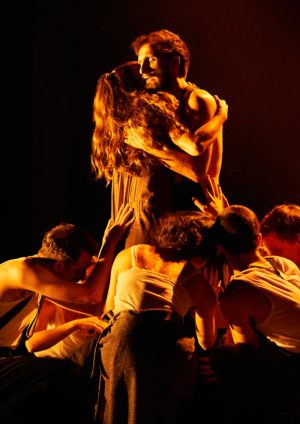You have no items in your cart. Want to get some nice things?
Go shopping
Picture Credits: Richard Haughton
Physical theatre is hard to define only until you’ve seen it, after which it couldn’t be more obvious. In their practice, Ipswich-based physical theatre company Gecko blend music, mime, choreographed movement, spoken word and imagery. In their latest show, The Wedding, performed at the Barbican as part of the London International Mime Festival, the result is a gloriously orchestrated piece of performance.
According to artistic director Amit Lahav, “We are all married, bound by the many contracts of modern life”. The Wedding is an exploration of what it means to become, and to be an adult in our society, with all the fun, challenges, misunderstandings, ties, and betrayals it brings about. From marriage presented as signing a contract to a group of homeless people and their penniless (though hilarious) life in a suitcase; from the disenchantment and oppression ensuing marriage to the violence associated with prejudice, the show goes from one poignant scene to another. Utterly brilliant is the tipsy evening, with people dancing, bantering, and bubbling around – the feeling of being inside the party and getting inebriated with the cast is palpable. The closing scene, with all the cast sitting, clapping and stomping, is powerful and downright inspiring. Ranging from the most philosophical to the insanely funny and nonsensical, The Wedding has all areas of life covered.
What is compelling about the show is that it fleshes out its themes by means of association of ideas and concepts embodied in motion. It doesn’t merely represent a series of situations on stage – it makes the audience feel them, through intense and intimate communication. Arms, chests, heads, shoulders and legs are all moved skilfully, miraculously carrying with them so much more than just gracious movements – they are true vehicles of meaning. While spoken word is not absent (featuring as many languages as the nationalities of this international company), words are not the main medium through which ideas are communicated. The power of physicality makes the show understandable, relatable, at times immediate. Mind you, analytical thinkers better step away, and everyone should embrace the synthetic, emotional, and metaphorical.
Music is an essential part of the show, and on more than one occasion it seems to be produced directly by the actors on stage. Stealing the show is their simultaneous breathing, which makes soft and swift sounds, which the audience find themselves almost invited to echo with their own breathing. Other times, the music comes from the actors tapping their own bodies, each with their own proper vibrancy and intensity, highlighting once again the physical nature of the show. Whether it is through simple rhythms or proper scores, music complements the action as another key element used to carry the show’s message across.
Enhanced by a movable, simple, but effective set design, The Wedding is the story of all of us as we face life’s responsibilities and bonds, in our mutual interactions with our fellow human beings. It’s what theatre, dance, and music should all aspire to do, and using the best of all three the show succeeds in producing a distillate of pure and simple theatrical magic.
About Anna Zanetti
Anna graduated from the University of Oxford with a BA (Hons) in Classics, specialising in Literature, Aesthetics and Ancient Art. Currently based in London, she has eclectic interests, including avant-garde art, cycling, reading, contemporary dance, opera, (watching) rugby, and anything to do with Latin. She writes for The Oxford Culture Review, Theatre Bubble and A Younger Theatre, as well as keeping a personal blog about arts and culture.
- Web |
- More Posts(10)





One comment